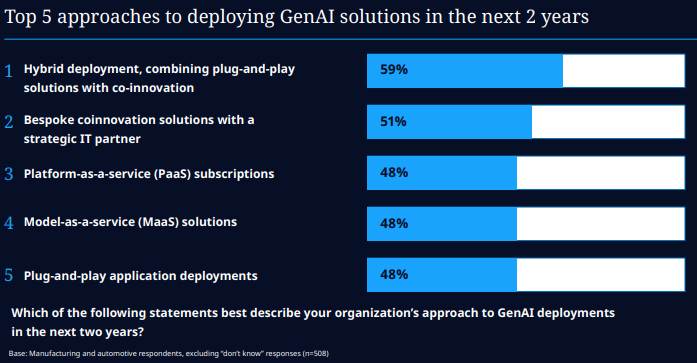The NTT report, "Feet on the Floor, Eyes on AI: Do You Have a Plan or a Problem?" of over 500 manufacturing leaders across 34 countries indicate widespread optimism regarding GenAI's capabilities, with 97% of participants from the Asia-Pacific region affirming use of GenAI and claims of already enhancing efficiency and profitability.
Additionally, 99% of participants in APAC believe that integrating Internet of Things (IoT) data into GenAI models will significantly boost the accuracy of AI outputs. Coupling GenAI with digital twins is expected to enhance asset performance and supply chain resilience, according to 97% of APAC respondents.
Manufacturers are primarily leveraging GenAI for supply chain and inventory management, knowledge management, quality control, research and development, and process automation.


"AI is streamlining processes and redefining what’s possible across the entire manufacturing value chain," said Prasoon Saxena, co-lead of Products Industries at NTT DATA. He added that GenAI is critical for adapting to fast-changing business environments, particularly amid fluctuating global tariff policies.
However, despite the clear benefits, the report highlights significant challenges that manufacturers face. Among APAC respondents 91% indicated that outdated technologies impede essential initiatives, yet less than half have performed a comprehensive infrastructure readiness assessment.
While 99% acknowledge the importance of IoT integration for improving GenAI outputs, many lack the confidence to execute these integrations successfully.
Ethical frameworks also pose a challenge. Only 48% of manufacturing leaders in APAC strongly believe their organisations adhere to a robust ethical AI framework that balances risk with value creation. Workforce readiness is another pressing issue, with 53% in APAC reporting that their employees lack the necessary skills to utilise GenAI effectively.
Data management capabilities are equally concerning, as just 46% of manufacturers in APAC feel confident in their data storage and processing resources to support GenAI workloads.
Saxena warns, "Companies failing to plan, deploy, and govern GenAI strategically may not only encounter problems but could be setting themselves up for failure."



